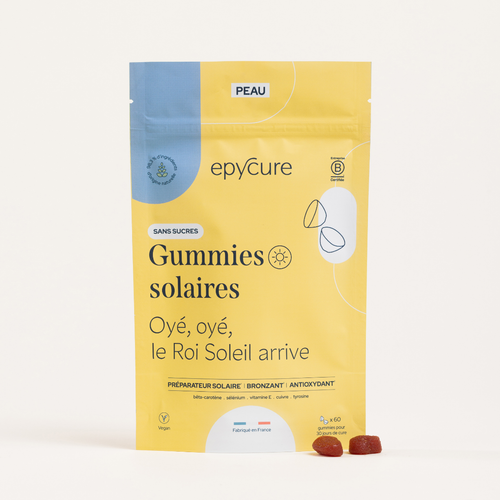The sun is finally coming out and the desire to tan is growing day by day! The sun is good for morale and for our health since it helps us synthesize vitamin D. But the skin requires special attention. Indeed, our exposure must be reasoned because it weakens skin cells, accelerates skin aging and destroys our solar capital. Therefore, you must adopt the right reflexes to tan while protecting yourself from the sun's rays. We know that using sunscreen and limiting exposure to midday are essential protective factors for skin health. Antioxidant and anti-inflammatory diets also play an important role in preventing sun damage, as do certain beauty rituals. We present to you some simple tips and actions to apply to help you prepare your skin for the sun.
What diet?
Food
Diet plays a key role in the health, coloring and hydration of the skin . Indeed, our food choices can influence our tolerance to ultraviolet rays , help protect us against their damage and thus contribute to the radiance of the skin .
Carotenoids, components from plants, are involved in the synthesis of melanin, a pigment which contributes to natural tanning . It also protects against sun damage by partially blocking free radicals from ultraviolet rays . This reduces the intensity of sunburns , delays their appearance, and improves skin pigmentation. The carotenoid family includes beta-carotene , lycopene, lutein and zeaxanthin.
Beta-carotene is an antioxidant that fights free radicals by forming a small protective film on the epidermis and thus limits damage caused by UV rays . In addition to protecting your skin thanks to its richness in antioxidants, beta-carotene is your ally for a healthy glow. It is found in fruits and vegetables with orange pigments such as carrots , mangoes, tomatoes, peppers but also in green leafy vegetables and cruciferous vegetables such as cabbage.
Lycopene is found in plants with red pigments such as tomatoes, red peppers, red cabbage, watermelon, grapefruit, melon and papaya.
Finally, lutein and zeaxanthin are found in spinach, pumpkin and cruciferous vegetables such as broccoli and cabbage.
Vitamins C and E also have protective effects against free radicals, generated by sun exposure , which can damage the skin . Vitamin C can also help fight the signs of aging because it participates in the body's natural synthesis of collagen. It helps heal damaged skin and, in some cases, reduce the appearance of wrinkles. Here are the best sources:
- Vitamin C: kiwis, citrus fruits, strawberries, broccoli, cabbage, Brussels sprouts, kale, red peppers and parsley
- Vitamin E: avocado, sardines, eggs, sunflower seeds, hazelnut oil and rapeseed oil
According to some studies, essential fatty acids such as omega 3 increase tolerance to ultraviolet rays and reduce the skin 's susceptibility to sunburn thanks to their anti-inflammatory properties. They also promote skin regeneration. The best sources of omega 3 are fatty fish (salmon, sardines, anchovies, mackerel, herring), rapeseed oil and flax and chia seeds.
What beauty rituals?
Exfoliation
To remove dead skin accumulated during the winter, consider exfoliating your skin . After the winter season, the skin needs to be cleansed and restored. You can exfoliate once a week to rid it of all dead cells, refine your skin texture, deep clean your pores and stimulate blood circulation. This way, your skin will be reboosted and your tan will be faster and more uniform.
Hydration
Dry skin is more likely to be sensitive to ultraviolet rays , while deeply nourished skin is more resistant to the sun 's attack by preventing the oxidation created by ultraviolet rays on the skin . Proper hydration of your skin will make it more beautiful, increase its protection and allow you to have a nice tan .
This is why it is recommended to apply a moisturizer every day, morning and evening, and to drink at least 1.5 liters of water per day. You can use carrot oil or carrot macerate to moisturize, stimulate and lightly color the skin . Indeed, we know that carrots make you look good. They are rich in beta-carotene and vitamin A which allows them to increase the production of melanin and thus boost tanning naturally. It is recommended to apply it morning and evening to stimulate the skin 's radiance while preparing it for exposure to UV rays .
Protection
The sun 's rays are able to penetrate deep into the skin . They have both beneficial effects on the skin , since they promote the synthesis of vitamin D, but also negative in the event of overexposure because they cause the appearance of sunburn , pigmentation spots, accelerate the aging of the skin. skin and increase the appearance of cancer.
We can never repeat it enough, but respect the precautions for using the sun by not exposing yourself during the hottest hours (12 p.m. to 4 p.m.) and by applying your sun cream systematically before exposure , whether at the beach, the mountain, in your garden or on the terrace.
To protect your skin effectively, it is essential to use a suitable sunscreen, at least index 30 or 50. It will help stop a large part of UV rays to combat their harmful effects.
Tan accelerator
Urucum is a hundred times richer in beta-carotene than carrots . Urucum powder contains zinc, copper and selenium. These are antioxidants that allow it to fight against skin aging and promote the production of collagen. This powder can be mixed with certain vegetable oils such as apricot kernel oil to prepare the skin for the first rays of the sun . This mixture can be used as a preparation for the sun or as an after-sun oil to prolong the tan .
Beware of UV machines!
UV rays in cabins do not at all prepare the skin for the sun and do not protect it from sunburn . On the contrary, they make it more sensitive to the harmful effects of the sun , reduce your solar capital and accelerate the risk of skin cancer.
Sugar-free solar gummies
To help you protect your skin and prepare your tan from the inside , you can turn to food supplements. They can be tanning accelerators and reinforce the skin's self-protection . This is the case with our sugar-free Sun Gummies , small chewing gums with a delicious cherry flavor that prepare your skin for the sun's rays. Rich in beta-carotene , selenium, zinc, vitamins C and E, they will help protect your skin against the sun's rays while gently preparing your tan. Indeed, the beta-carotene is rich in carotenoids and thus helps protect skin cells and boost the production of melanin in order to obtain beautiful, naturally tanned skin. Vitamin E, zinc and selenium are antioxidants that help strengthen the skin's protection against damage induced by UV rays and therefore fight against premature aging of the skin. Vitamin C helps the body synthesize collagen and is therefore an ally in preparing the skin for the sun. It also promotes healing and helps delay sunburn. Finally, copper contributes to the normal pigmentation of the skin and tyrosine to the optimization of the tan.
To optimize their effects, it is recommended to start the treatment at least three weeks before exposure to the sun , to follow it during exposure , then two to three weeks after exposure . They obviously do not fully protect you against UV rays so applying sunscreen remains essential.
Our treatments have been formulated so that they can be combined with each other. For example, you can pair your sugar-free Sun Gummies with the Hydration & Clear Skin Cure by opting for the Sun Beauty Pack . It will help you optimize your tan while fighting against sun-induced inconveniences (imperfections, dehydration, redness, fine lines, etc.).
To find out everything about tanning and our tips to apply this summer, download our tanning booklet by clicking right here.



